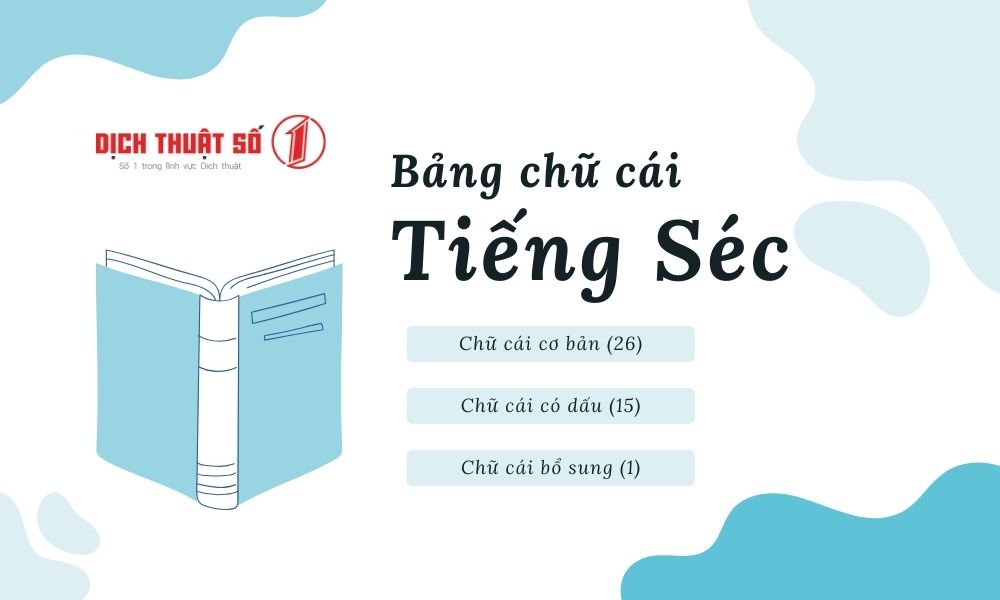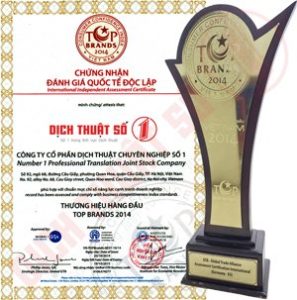The official name of the Czech Republic in the United Nations is “Česká republika”, shortened to “Česko” in Czech. In English, the Czech Republic is translated as “Czech Republic” or “Czechia”. Czech is also known as Czechoslovakia (after the country's former name).
In the following article, let's No.1 Translation Go deeper into the Czech language as well as the process of learning Czech and the benefits it brings.
>>> See more: Czech translation high quality
Czech Republic – Country and Language Overview
- Czech Republic English Name: Czech Republic
- Official language: Czech
- Other languages: Slovak, German, English
- Czech Republic abbreviation: CZ (according to ISO 3166 code)
- Capital: Prague
- Population: Approximately 10.67 million (2022)
- Acreage: 78,866 km²
- Location: Central Europe, bordering Germany, Poland, Slovakia and Austria.

Czech (čeština; English: Czech) is a West Slavic language and is closely related to Slovak, Polish, Pomeranian (an extinct language) and Sorbian.
The Czech Republic is about 15-20 hours flight time from Vietnam depending on the stopover and airline.
>>> See more: Interview experience for Czech Visa
Czech alphabet
Czech uses the Latin alphabet with some diacritics to indicate special sounds. The alphabet consists of 42 letters, including accented letters.
- Basic letters (26):
- a, b, c, d, e, f, g, h, i, j, k, l, m, n, o, p, q, r, s, t, u, v, w, x, y, z
- Accented letters (15):
- ah, é, í, o, ú, ů, ý
- č, ď, ě, ň, ř, š, ť, ž
- Additional letter (1): ch

Note:
- The letter “ch” is considered a separate letter, not a combination of “c” and “h”.
- Accented letters (except “ů”) are considered separate letters and are arranged after the base letter in the alphabet.
- The letter “ě” does not have its own sound but softens the consonant before it.
- The letter “ř” is a unique sound, a combination of the sounds /r/ and /ʒ/.
Example:
- á: pronounced like “a” in “father”
- č: pronounced like “ch” in “church”
- ř: special vibrato sound, not found in Vietnamese
- š: pronounced like “sh” in “ship”
Learning the alphabet is an important first step to learn CzechBy becoming familiar with the letters and their pronunciation, you will have a solid foundation for further learning.
>>> See more: Translate from Czech to Vietnamese
Basic grammatical features in Czech

Czech has quite complex grammar compared to Vietnamese or English, requiring learners to invest time and effort to master it. Below are some basic grammar features to note:
1. Grammatical cases
Czech has seven grammatical cases, which affect the form of nouns, adjectives, pronouns and numbers. Each case has its own function in the sentence:
- Method 1 (Nominative): Subject of the sentence.
- Method 2 (Genitive): Expressing possession, origin, or relationship.
- Method 3 (Dative): Indirect object, refers to the object receiving the action.
- Method 4 (Accusative): Direct object, refers to the object directly affected by the action.
- Method 5 (Vocative): Used to call or address.
- Method 6 (Locative): Only location, place.
- Method 7 (Instrumental): Only means, ways to perform an action.
2. Gender
Nouns in Czech are divided into 3 genders:
- Male:Examples: muž (man), stůl (table)
- female:Examples: žena (woman), židle (chair)
- neutral:Examples: títě (child), město (city)
The gender of a noun affects the conjugation of its accompanying adjectives, pronouns, and verbs.
3. Aspects
Czech verbs have two forms:
- Perfective: Describes an action that has been completed or has a clear result.
- Imperfective: Describes an action that is in progress, a repeated action, or an action that has no clear result.
4. Other features
Verbs in Czech are conjugated according to person, number, tense, aspect and case. Additionally, questions in Czech are often formed by changing the word order or adding a question word at the beginning of the sentence.
Learn Czech grammar It requires patience and effort, but the reward will be the ability to communicate effectively and a deeper understanding of the Czech language and culture.
Is it difficult to learn Czech?
Czech, with its complex grammar system and special pronunciation, is considered a relatively difficult language for Vietnamese people to learn.
However, with the right learning method and perseverance, you can completely conquer this language.
How to learn Czech effectively:
- Start with the basics: Master the alphabet, pronunciation, grammar, and gender before moving on to more complex topics.
- Use a variety of learning materials: Combines textbooks, language learning apps, movies, music and other materials for comprehensive learning.
- Practice regularly: Spend time every day reviewing and practicing listening, speaking, reading, and writing skills.
- Seek support: Take a course, find a tutor, or connect with the Czech learning community for guidance and encouragement.
- Immerse yourself in Czech culture: Watch movies, listen to music, read books and learn about Czech culture to increase interest and understanding of the language.
Self-study Czech is a viable option, but requires a high level of discipline and motivation. Using online learning materials and tools, combined with regular practice and seeking support when needed, will help you achieve your learning goals.
>>> See more:
Czech language learning materials and tools
- Czech language learning books: “Czech Step by Step”, “Complete Czech Beginner to Intermediate Course”
- Czech language learning app: Duolingo, Memrise, Drops
- Czech Dictionary: Seznam Slovník, Google Translate
- Website to learn Czech: CzechClass101, iTalki
Common Czech phrases in communication
Here are some common Czech phrases and vocabulary used in everyday communication:
Common Czech phrases in communication:
- Hello – Hello
- Good morning – Good morning
- Dobré odpoledne – Good afternoon
- Dobrý večer – Good evening
- Goodbye – Goodbye
- Please – Please
- Thank you – Thank you
- Promiňte – Sorry
- Ano – Yes
- Ne – No
Czech numbers:
- jeden – one
- dva – two
- I – Dad
- four – four
- year – year
- six – six
- sedm – seven
- osm – eight
- devět – nine
- deset – ten
Czech vocabulary:
- House – House
- Auto – Car
- Kniha – Books
- Škola – School
- Jídlo – Food
- Voda – Water
- Friends – Friends
- Rodina – Family
- Mesto – City
- Zdraví – Health
Can I study in Czech Republic in English?
The Czech Republic is increasingly attracting international students, and it is possible to study here in English. Many Czech universities offer English-taught programs at bachelor's, master's and doctoral levels, catering to a wide range of student needs.
Some Czech universities with study programs in English:
- Charles University (Univerzita Karlova)
- Masaryk University (Masarykova univerzita)
- Czech Technical University in Prague (České vysoké učení technické v Praze)
- University of Economics, Prague (Vysoká škola ekonomická v Praze)
- Palacký University Olomouc (Univerzita Palackého v Olomouci)
>>> See more:
Are Czech and German similar?
Czech and German belong to the same language branch, the Germanic family, so they share some words and phrases that have common roots. However, they are not exactly the same and speakers of the two languages are largely incomprehensible to each other.
If you need quality Czech translation, Translation Number 1 is always willing to support. Please contact us immediately to receive detailed advice and quotes.








